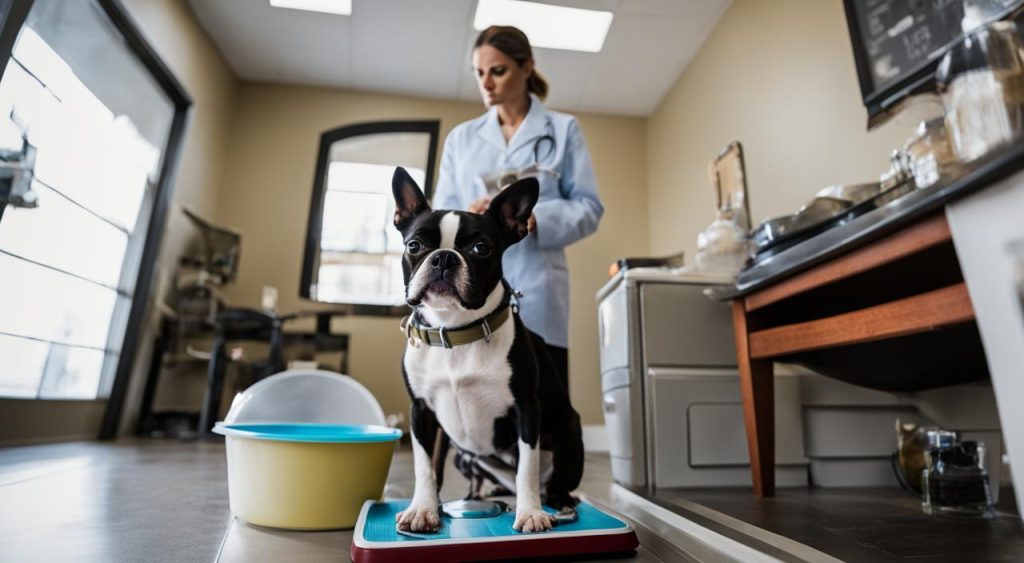Boston Terriers, with their unique charm and lovable personality, are a popular choice for dog owners. But do Boston Terriers have special needs that you should be aware of? The answer is yes. Caring for a Boston Terrier involves understanding their specific requirements to ensure their health and happiness.
Boston Terriers require special care and attention to maintain their overall well-being. From exercise to grooming, these adorable dogs have breed-specific needs that should be addressed to keep them healthy and thriving. To provide the best care for your Boston Terrier, it’s essential to understand their health requirements and implement a proper care routine.
Proper exercise is crucial for Boston Terriers. Regular physical activity helps them maintain a healthy weight and prevents obesity, which can lead to various health issues. Engaging in interactive play sessions and daily walks fulfill their exercise needs and provide mental stimulation.
Grooming is another important aspect of caring for a Boston Terrier. Their short coat requires minimal maintenance, but regular brushing helps keep their fur clean and reduces shedding. Additionally, their adorable facial wrinkles and ears should be cleaned regularly to prevent infections.
When it comes to their diet, Boston Terriers have specific dietary requirements. Feeding them high-quality dog food formulated for small breeds is recommended. Portion control is essential to prevent weight gain, and you should consult with your veterinarian for guidance on the best diet plan for your Boston Terrier.
Keeping a Boston Terrier healthy also means being aware of potential health issues. Like any breed, Boston Terriers can be prone to certain health conditions, such as eye problems and respiratory issues. Regular veterinary check-ups and prompt attention to any signs of discomfort or illness are crucial in maintaining their well-being.
In summary, Boston Terriers do have special needs that require attention and care. Understanding their exercise, grooming, dietary, and health requirements is essential for keeping them happy and healthy companions.
Key Takeaways:
- Boston Terriers require proper care, exercise, grooming, and a specific dietary regimen.
- Regular exercise is crucial to maintain their weight and overall health.
- Grooming, including brushing and cleaning facial folds, is important for their hygiene.
- Feeding them high-quality dog food and consulting with a veterinarian for diet advice is recommended.
- Being aware of potential health issues and scheduling regular veterinary check-ups is vital.
Are Boston Terriers good emotional support dogs?
Boston Terriers are popular choices as emotional support dogs due to their friendly and outgoing nature. Their innate ability to provide comfort and companionship makes them well-suited for individuals dealing with various mental and emotional conditions.
One area where Boston Terriers excel is in assisting children with autism. Their playful and loving nature can have a positive impact on the emotional dynamics within families. These dogs are known to form strong bonds with their human companions, offering unwavering support and understanding.
Boston Terriers are also suitable as therapy dogs due to their calm and well-behaved demeanor. Whether in hospitals, nursing homes, or rehabilitation centers, these dogs have a remarkable ability to alleviate stress and bring joy to those in need.
Common health issues in Boston Terriers
Like any other dog breed, Boston Terriers are susceptible to certain health issues that owners should be mindful of. By being aware of these potential health concerns and taking proactive measures, you can help ensure the well-being of your Boston Terrier.
Boston Terrier eye problems
One common health issue in Boston Terriers is eye problems. They can be prone to cataracts, which are cloudy areas that develop in the lens of the eye, causing blurry vision. Another eye problem they may face is dry eye, a condition where the eyes don’t produce enough tears to keep the surface of the eye moist and healthy.
Boston Terrier dental disease
Dental disease is another health issue that Boston Terriers may experience. Poor dental hygiene can lead to the buildup of plaque and tartar, which can result in gum disease, tooth decay, and bad breath. Regular dental care, such as brushing their teeth and providing dental treats, can help prevent dental issues.
Boston Terrier obesity
Obesity is a growing concern among Boston Terriers, just like in many other dog breeds. Being overweight can put additional stress on their joints and organs, leading to a range of other health problems. Proper portion control, a balanced diet, and regular exercise are crucial to maintaining a healthy weight for your Boston Terrier.
Boston Terrier bone and joint problems
Boston Terriers can be prone to bone and joint issues such as patellar luxation, where the kneecap slips out of place. The short and compact body structure of Boston Terriers can contribute to these issues. Regular vet check-ups and controlled exercise can help minimize the risk of bone and joint problems.
Boston Terrier respiratory problems
Respiratory problems are also a concern for Boston Terriers due to their brachycephalic (short-muzzled) structure. They may experience difficulties in breathing, especially in hot or humid conditions. It’s important to provide them with a cool and well-ventilated environment, avoid strenuous activities in extreme temperatures, and monitor their breathing for any signs of distress.
By staying vigilant and addressing these common health issues, you can help keep your Boston Terrier healthy and improve their overall quality of life.
Conclusion
In conclusion, it is important to understand that Boston Terriers have special needs that require careful attention and care. As friendly and trainable dogs, they can excel in roles as emotional support dogs and therapy dogs, providing comfort and companionship to individuals in need. However, potential owners must be aware of the health considerations associated with this breed.
Boston Terriers are prone to certain health issues, including eye problems, dental disease, obesity, and respiratory problems. Regular veterinary check-ups are crucial in identifying and addressing these issues early on. Additionally, providing a nutritious diet, regular exercise, and appropriate grooming can help to maintain their overall well-being.
By meeting their specific needs and addressing their health considerations, you can ensure that your Boston Terrier leads a happy and healthy life. Remember, proper care, attention, and understanding of their unique requirements are the keys to providing the best possible care for your beloved Boston Terrier.





